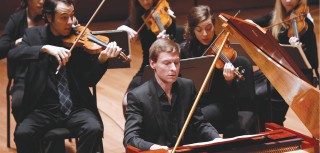Title

Kristian Bezuidenhout leading Juilliard415 in 2014.
(Photo by Michael DiVito)Juilliard415 will kick off the new semester with a January 23 concert led by renowned fortepianist Kristian Bezuidenhout that continues the ensemble's tradition of working alongside some of the most sought-after figures in the world of historical performance. Bezuidenhout made his directorial debut with Juilliard's period-instrument student orchestra in a 2014 concert that paired Mozart with two offspring of Johann Sebastian Bach—Johann Christian and Wilhelm Friedemann. January's program is similarly conceived, opening with a string symphony by another of J.S. Bach's prolific sons—Carl Philipp Emanuel—and continuing with a fresh set of piano and orchestral music by Mozart.
Body
Though Bezuidenhout is fluent in keyboard instruments and idioms from the early Baroque onward, anyone familiar with his career will associate him most closely with Mozart, whom he has called “the most important musical figure” in his life. In a recent interview with The Journal, Bezuidenhout described what he feels makes Mozart's music exceptional. “It requires an extraordinary high level of interpretive decision making,” he explained. “And more than any other composer of his time, Mozart's music lives or dies by the commitment of the performer. I believe that he had an unbelievably high standard in mind—not just a technical one, but one that assumes a high level of literacy and grammatical knowledge.” Bezuidenhout's passion for Mozart is revealed as much in his insightful and uncannily electrifying performances as it is in his ability to wax poetic about the composer's music. “The music's melodic refinement and integrity, with theme after theme of perfection and beauty, are combined with a deep sense of melancholy. There is a wonderful sense that he's always inviting you to be as musical and lyrical as possible.”
Bezuidenhout's legendary keyboard chops will be on full display in January's concert, which includes a performance of Mozart's Fantasia in C Minor and the Piano Concerto No. 12 in A Major. Described by The New York Times as “a master in the improbable art of conducting without hands,” Bezuidenhout will lead Juilliard415 from the fortepiano during the concerto and possibly for the other orchestral pieces (the art of keyboard continuo accompaniment was by no means dead in Mozart's time, and certainly not in C.P.E. Bach's). Though he's a strong advocate of performing on historical keyboards, Bezuidenhout acknowledges that the wide variety of pianos available in the late 18th century, during which the instrument was evolving rapidly, makes it difficult to nail down a perfect Mozart piano. “Mozart owned an instrument built by Anton Walter during his final years, though we have no idea what kind of condition it was in” due to extensive modifications made to it after Mozart's death, Bezuidenhout said. “Walter's instruments from around this time seem ideal to me for playing Mozart. They do a lot of the work for you, in that there is so much variety in the various registers of the instrument, which is a feature that I believe Mozart absolutely exploited in his music.”
Closing the program will be Mozart's familiar Eine Kleine Nachtmusik, though one can safely expect an interpretation that will provide a sharp contrast to the typical wedding performance. As for the symphony by C.P.E. Bach that's on the program, Bezuidenhout confirmed it will serve as a gentle reminder that, for all his originality, Mozart learned as much from others as others have learned from him. Mozart paid a visit to C.P.E. Bach while passing through Hamburg shortly before Bach's death in 1788, and reportedly said of him that “He is the father, we are the children. Those of us who know anything at all learned it from him.” The influence of the youngest Bach brother, Johann Christian, on Mozart's style was perhaps even stronger. Including this less frequently performed music in a Mozart-centric program is certainly not necessary for the sake of variety. But it is helpful to be reminded that no composer, even one as innovative as Mozart, works in a vacuum.




